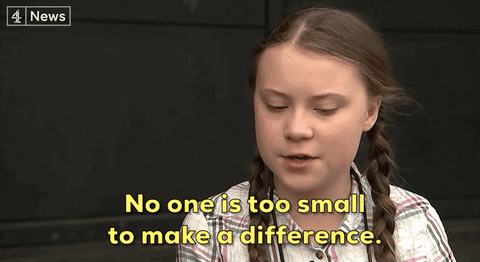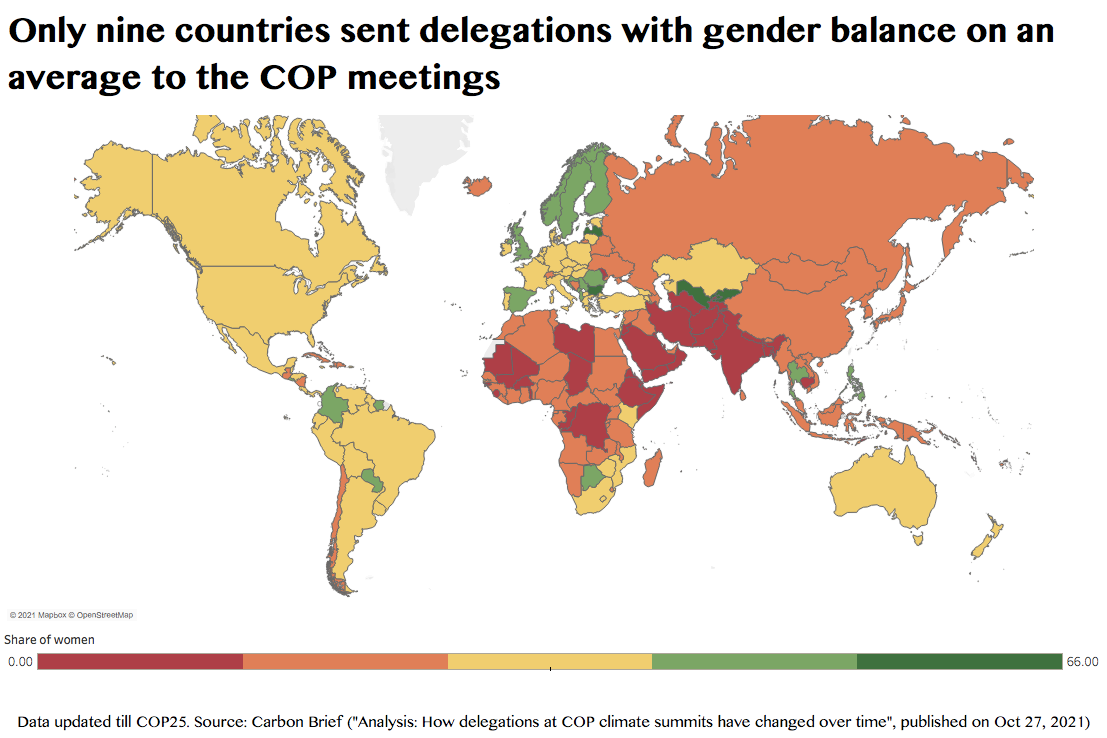Without parity, summits like COP26 only make a mockery of climate justice, and other stories
#WomenLead (Issue 73): Your weekly round-up on women in politics
Hello, and welcome to Issue 73!
This week, we dive into the event of the moment - the COP26 - and sift through what the representation has looked like at the highest seat of the climate negotiation table all these years. We also have reading recommendations from India, Brazil, quick updates from Japan and the evil empire [a.k.a. Facebook]. Read on, and if you find this edition insightful, do share it with your friends, colleagues and on your social media. Thank you! And in case you missed last week’s edition, you can read it here.
Quick Updates
😡 A SHAMEFUL SHOW: General elections were held in Japan over the weekend. Forty five women have been elected to the House of Representatives, two less than the previous house elected in 2017. They make up less than 10 percent of the 465-member house. This is despite a new law brought in 2018 that encourages political parties to give tickets to women in equal numbers as men.
😈 RISK REDUCTION, BUT FOR WHOM? Among all the dirt that is coming out of the leaked information on Facebook emerging from the documents provided by whistleblower Frances Haugen is this - the company knows that its platform can often be a toxic place for women politicians. In fact, the company actually grew worried about this problem in the run-up to Germany’s national election earlier this year, a report in Forbes shows.
So what did it do? It did the typical stuff - trained women on how they can protect themselves while using Facebook. It called the initiative “Strong Women, Strong Politics”.
Guess what was the motivation. In case you were wondering, it was some commitment to women’s rights, hold your 🐴🐴🐴. The aim was, in the company’s own words, to “minimize the risk of bad experiences with our platforms”...so that it can...wait for it … “reduce the risk of having to deal with newly elected officials who have just had a really negative experience on Facebook” (!!!).
Subscribe to #WomenLead, a one-of-its-kind weekly newsletter that brings you the most important and exciting updates about women in politics from around the world.
Spotlight: GLOBAL🌎🌍🌏
Haga clic aquí para leer el español
All eyes are turned towards Glasgow where the COP26 - or the 26th United Nations Climate Change Conference - is currently underway. The conference (being dubbed as humanity’s “last chance” to tackle climate change) is the biggest stage for a wide range of countries, communities and stakeholders to come together to discuss the issue of climate change.
Hold on, did we just say “wide range”? 🤔🤔
Well, we doubt. There are already complaints that certain communities are under-represented at this all-important meeting. Campaigners say it excludes people from frontline communities from the global south, and is the “whitest and most privileged” climate summit ever. Plus, as it happens everywhere, there are not enough women!
We don’t need to explain the critical importance of including women at COP26, or any other environment-related discussion for that matter. Women have the right to be there: their voices, their views matter.
And it’s not just us saying this.
There is now ample recorded evidence to show that climate change impacts women and girls more severely, and in multiple ways.
Firstly, women represent a high percentage of poor communities that are highly dependent on local natural resources for their livelihood, particularly in rural areas where they shoulder the major responsibility for household water supply and energy for cooking and heating, as well as for food security, notes the United Nations.
Second, climate change can disrupt women’s lives much more severely. In fact, UN figures suggest that women make up 80 percent of those displaced by climate change. It also exacerbates gender-based violence, leads to higher risk of child marriage, and jeopardizes well being.
Third, women tend to shoulder a greater burden of securing the household during extreme weather events such as droughts and floods. There is more, but we hope we’ve made our case.
Further, evidence shows that including women (and especially women from marginalized communities) helps in taking more robust and sustainable decisions at such events. Empowering women means more effective climate solutions, notes the UNFCCC.
Young girls and women are also leading the fight for environment and climate justice around the world. Yes, Greta Thurnberg is one, and she is one among many at the frontlines.
And yet, national delegations and international institutions seem to be particularly indifferent to logic and reason.
Why else, for example, would the UK (the host nation) decide to put together an all-male ensemble for the 2021 gathering?

Last year, an investigation by The Guardian revealed that the country had lined up all men to represent it at the COP26. Women were there at junior levels, while men were there as the speakers, negotiators and leaders. She Changes Climate, a campaign calling for 50 percent representation of women at the top levels of all climate delegations, sent an open letter to the government, calling it a “step backwards” and “a failure of responsibility to put together the strongest and best equipped team”. The letter said:
“It is incomprehensible that half the planet is not represented in the senior leadership team where the framing, narrative, issues and content for COP26 will be decided, when it is widely acknowledged that the role of women is critical in tackling the climate and ecological emergency.”
After the uproar, the final team comprised 45 percent women (though men remain dominant in senior and public facing roles).
However, all is still not well elsewhere.
Women have made up just one in every four members in total across all delegations at the COP. Across all COPs so far (i.e. up to COP25), delegations have comprised just 25 percent women, data compiled by Carbon Brief shows. This improved from 12 percent at COP1 (1995) to 38 percent at COP23 (2007), but then stagnated.
At COP18 in 2012, it was agreed that all parties needed to make additional efforts to improve women’s participation in bodies established under the Convention. So, the UNFCCC then began compiling this data.
Here are some of its latest findings released in August (data is until sessions of subsidiary bodies held until June 17):
As of 2021, women’s representation varies between 10 percent to 63 percent on various committees and bodies constituted under the UN Framework Convention on Climate Change. Only three bodies have equal or higher representation of women.
On an average, only one in three positions on various constituted bodies is occupied by women in 2021, the same as 2020 and 2019.
There was near parity in the composition of party delegations to the most recent UNFCCC sessions held virtually earlier this year. Women made up 49 percent members of these. However, they made up 39 percent of the heads and deputy heads of the delegations.
Even though men accounted for 51 percent members in the 2021 sessions, they comprised 60 percent of delegates who spoke in plenaries. Three in every four speakers in finance meetings were men. Men also took up three-fourth of the speaking time among all speakers in plenary meetings.
The irony? Across the world, women are most likely to be in charge of ministries related to the environment, shows data from the Inter-Parliamentary Union. And yet, when it comes to the highest negotiation table, equal representation continues to elude. (Did they not say COP26 was our last best chance?)
Reflections and Reads:
Quotas get more women elected, but gender parity is still a long way off, World Politics Review
Excerpt: ‘Bye, dear’: Sexism during Brazil impeachment, Associated Press
The emerging vote bank that every political party wants to tap, Mint
That’s a wrap for this week! If you liked reading this issue, please do press the like ❤️ button, and forward this to a friend/colleague or share it on your social media - reader endorsement is the only way newsletters grow! Please share widely. Thank you! We’ll see you next weekend with Issue 74!





